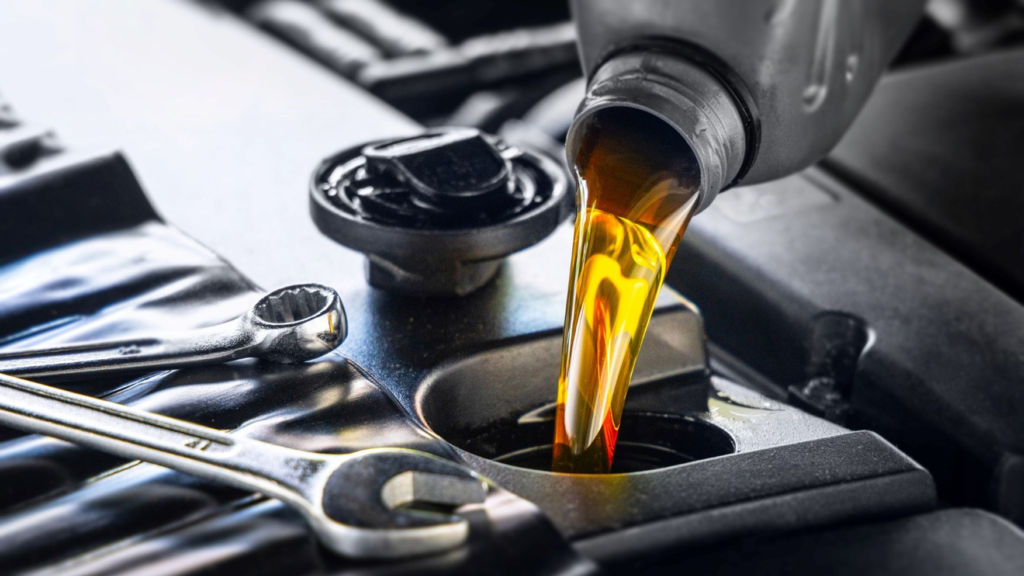
What is engine oil? If you are running a small or big car if you do “t maintain your engine oil then you have to lose your engine. Still, many people confuse about engine oil. Here we have all answers regarding engine oil.
What is engine oil?
Engine oil is a crucial component in maintaining the proper functioning of an automobile. It plays a vital role in lubricating the moving parts of the engine, preventing corrosion and wear, and reducing heat buildup. In this article, we will explore engine oil in detail, its composition, functions, types, and maintenance.

Composition of Engine Oil
Engine oil is a mixture of base oil and additives. The base oil is refined crude oil, which undergoes a refining process to remove impurities and contaminants. The refining process includes distillation, cracking, and hydroprocessing. The quality and type of base oil used to determine the performance and cost of the engine oil.
Additives are chemicals added to the base oil to improve its performance and characteristics. Additives include detergents, dispersants, anti-wear agents, anti-oxidants, and viscosity modifiers. These additives enhance the engine oil’s ability to clean, protect, and perform under extreme conditions.
Functions of Engine Oil
Engine oil has several critical functions in an automobile. These include:
- Lubrication: The primary function of engine oil is to lubricate the moving parts of the engine. Friction between metal parts can cause wear and tear, leading to engine damage. Engine oil creates a protective layer between the metal parts, reducing friction and preventing wear and tear.
- Cooling: Engine oil helps to dissipate heat generated by the engine. The engine’s moving parts generate a significant amount of heat, and the oil helps to absorb and distribute the heat, preventing overheating.
- Cleaning: Engine oil contains detergents and dispersants that help to keep the engine clean. These additives prevent the buildup of sludge, dirt, and debris, ensuring that the engine runs smoothly.
- Corrosion prevention: Engine oil contains anti-corrosion additives that help to prevent rust and corrosion in the engine. These additives protect the engine from damage caused by moisture and other corrosive elements.
Types of Engine Oil
There are several types of engine oil available in the market. The most common types include:
- Conventional Oil: Conventional oil is the most basic and widely used engine oil. It is made from crude oil and contains a balanced blend of additives. Conventional oil is suitable for most engines and is available at an affordable price.
- Synthetic Oil: Synthetic oil is made from chemical compounds, and its molecular structure is tailored to provide specific performance characteristics. Synthetic oil offers better protection and performance than conventional oil and is suitable for high-performance engines.
- High Mileage Oil: High mileage oil is designed for engines with over 75,000 miles. It contains additives that help to prevent leaks, reduce oil consumption, and minimize wear and tear on older engines.
- Racing Oil: Racing oil is specifically designed for high-performance engines used in racing and other extreme conditions. It contains additives that provide enhanced lubrication, cooling, and protection under high stress and temperature conditions.

Engine Oil Maintenance
Proper engine oil maintenance is crucial to ensure the longevity and performance of an engine. The following are some essential maintenance practices:
- Check the oil level regularly: It is essential to check the oil level regularly using the dipstick. Low oil levels can cause engine damage, and overfilling can also cause problems.
- Change the oil and filter regularly: Engine oil degrades over time and loses its effectiveness. It is essential to change the oil and filter regularly, as recommended by the manufacturer.
- Use the recommended oil: Always use the type of oil recommended by the manufacturer. Using the wrong oil can cause engine damage and void the warranty.
- Keep the engine clean: Keeping the engine clean can help to prevent the buildup of dirt and debris, which can lead to engine
- Tata Sierra vs Harrier: The Ultimate Top Trim Feature Comparison
- Toyota Urban Cruiser Ebella Vs Maruti e Vitara: Differences And Similarities Explained 2026
- Royal Enfield Sells Record Million-Plus Motorcycles in CY2025, Sets New Global Benchmark
- Toyota Urban Cruiser Ebella EV Unveiled in India: Toyota’s First Electric SUV for the Mass Market
- 2026 Honda Shadow 125 Launched: Compact Mini Cruiser for Modern Riders
